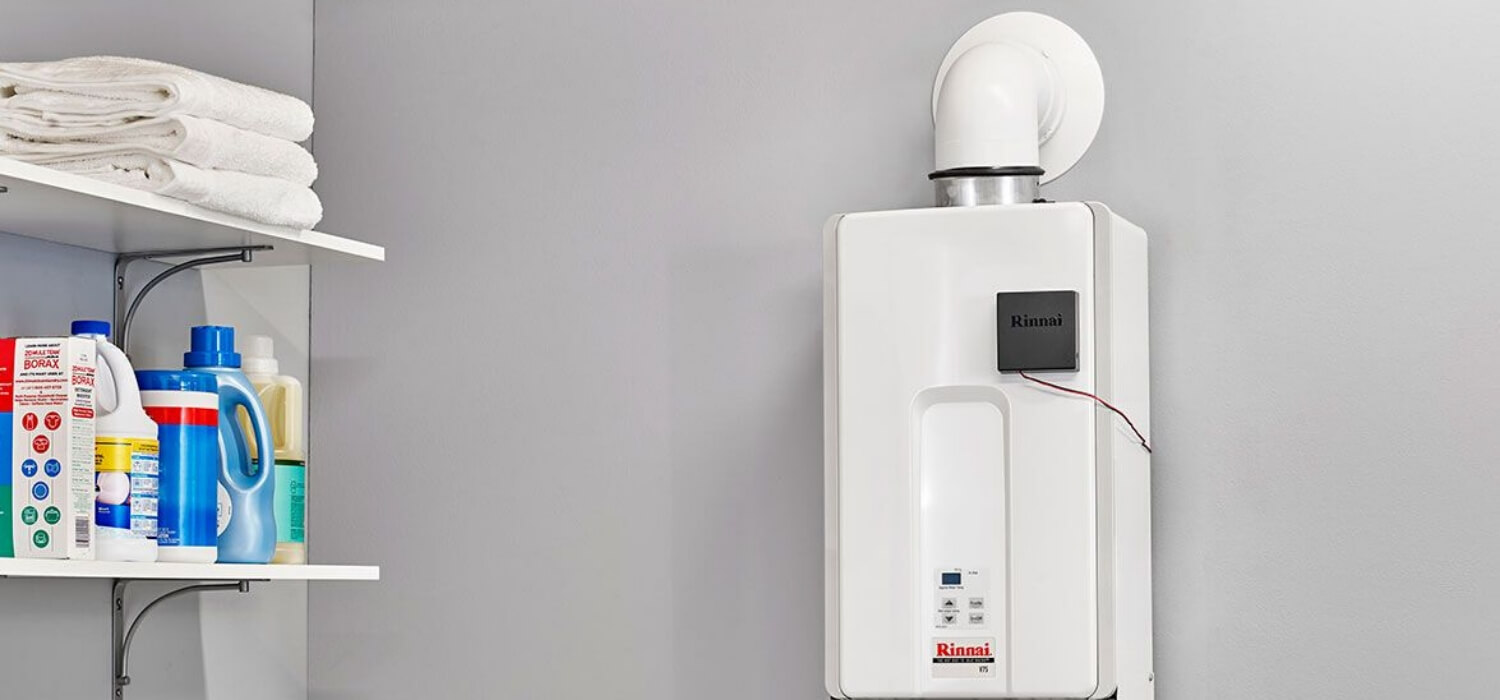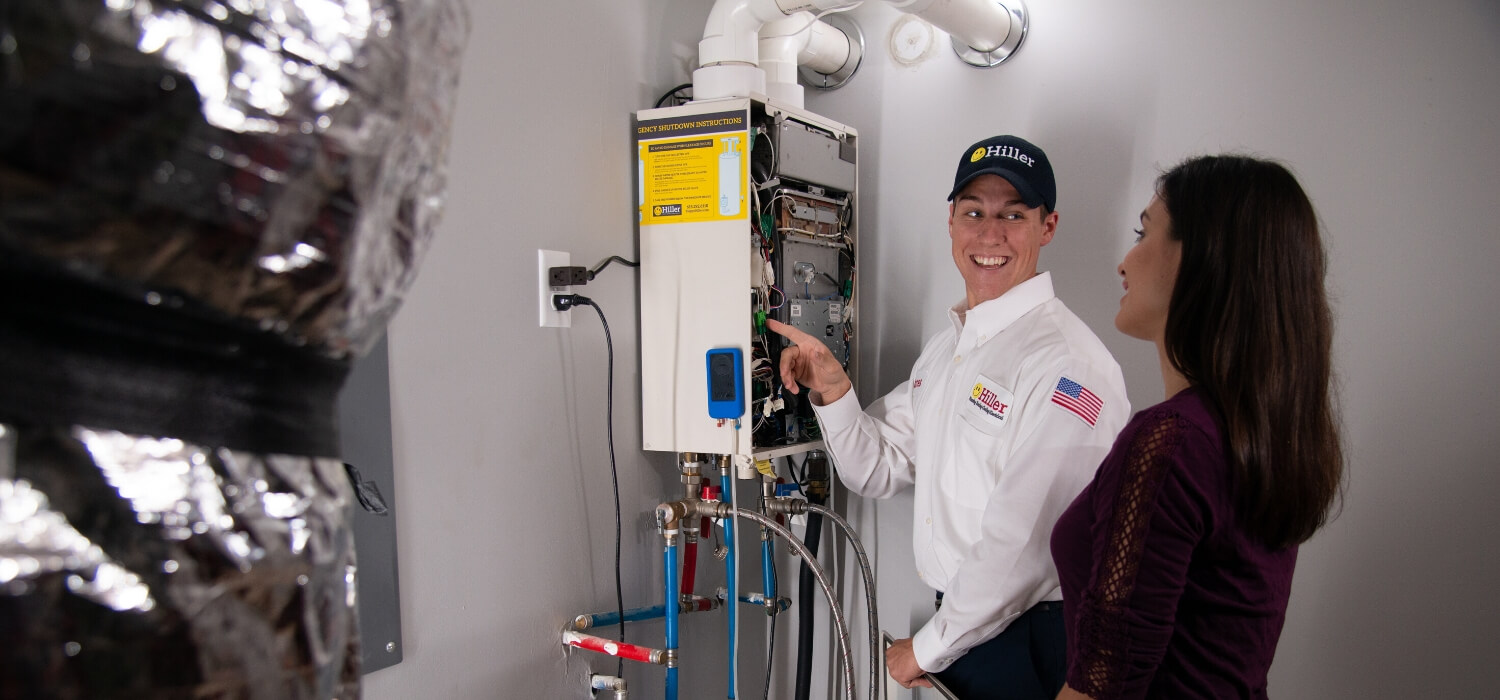What Size Tankless Water Heater Do I Need?
Enjoy reading the latest DIY articles and saving money?
Receive our latest helpful hints, tricks and savings, directly to your inbox.
Posted February 28, 2020
Want to cut your energy bill in half every single year? The answer is simple: install a tankless water heater at each hot water outlet in your home. There are so many benefits of a tankless water heater, it seems crazy not to get one. So, you’ve decided to opt for a tankless water heater–great! But how do you figure out the one your home needs? In this case, size matters, so here we’ll answer the question “what size tankless water heater do I need?”.
Step One: What Size Tankless Water Heater Do I Need For My Home?
Tankless water heaters are there to provide as much hot water as you need, whenever you need it. That’s because it reduces the amount of so-called standby energy losses.
Another great part about tankless water heaters is that they are tiny. Most of them are just around the same size as the suitcase. Another upside is most tankless water heaters last more than two decades. That’s at least twice as long as the lifespan of the traditional tank-based water heater.
Here’s the catch. When it comes to tankless water heaters, there are a few limitations in terms of how much water it can heat at once.
Can we be honest with you? If you choose to buy a tankless water heater that’s too small, it won’t be able to give you enough hot water to run your entire household. On the other hand, choosing a tankless water heater that is too large will result in overpaying month after month.
How to Size Your Tankless Water Heater
We can’t emphasize this enough, make sure that you purchase a properly sized tankless water heater before you pull your wallet out your pocket. To do so, we’ll show you how to pick the right size tankless water heater for your household. Plus, we’ll give you some insider tips on how to select the perfect one as well.
For starters, tankless water heaters receive ratings by their “maximum output water flow rate” at a certain temperature spike. Feeling confused? Read more to find out everything that you need to know below!
Step Two: How to Measure the Flow Rate
So, how many tankless water heaters do I need? To answer this question, you are going to have to figure out how to calculate the flow rate first. Take a look at what you should consider:
- How many gallons per minute of heated water that you’re going to need at peak consumption times
- The temperature rise requirements that are regulated by your output water temp settings and your feedwater temperature
Now that we’ve got that covered, under-sizing your tankless water heater is going to be a really bad idea as time goes on. Why is that? It’s easy – if you get too much hot water in your tankless water heater, then it will start throttling its flow immediately.
Of course, this can result in way less hot water at each outlet, leading to severe pressure drop or temperature drop. As if that’s not bad enough, running a tankless water heater at full speed can lead to it breaking down early too.
Meanwhile, buying a tankless water heater that’s supersized will end up with you paying a lot more cash upfront as well. What should you do? Fair question.
What is Your Peak Hot Water Demand?
First things first, it’s got to discover what your peak hot water demand is. Naturally, you can use a chart online to do this step. In it, it should list the standardized flow rates for various kinds of water outlets in the United States.
Additionally, you’ll need to match up your particular fixtures with those listed on the water flow chart as well. whether it is listed in your product manual or online. Next, you have to determine how many devices you’ll need to be able to use them at the same time!

Step Three: Choose the Best Tankless Water Heater
If you’ve ever felt confused about finding the best tankless water heater for your home, we’ve got the remedy. Before we dive into it, let’s discuss all of the different kinds of tankless water heaters first. To begin with, you should know that there’s a difference between gas and electric water heaters.
What happens when you upgrade your current tank-based water heater to a tankless water heater, it might make a lot of sense to stick to the same type of fuel to save cash on installation fees. Thinking about building a new home soon?
If that’s the case, then all you have to consider is the cost and the availability of the various types of fuel. But wait – there’s more. First things first, there is natural gas and electricity.
Understanding Natural Gas vs. Electric Power
Even though this depends on where you live, these are some of the cheapest fuel options that you can choose for your tankless water heater. However, propane is much more effective than the natural gas option since it has a higher level of British thermal units.
All that you have to do is compare the costs between each to decide which one is most ideal for you. Keep this in mind: since natural gas comes through a pipeline, it’s not necessarily available in every region. Otherwise, you’ll have to purchase your propane on your own.
Another word of advice is to get to know the difference between point-of-use and whole use. To put it more clearly, you can pick between at least one point-of-use system or a single tankless water heater for your whole house. What’s so special about point-of-use tankless water systems?
Step Four: What is Temperature Rise?
Once you’re done with everything that we’ve mentioned above, you can follow a simple math equation to calculate the flow rates. Now, what on earth does temperature rise have to do with tankless water heaters? We’re glad that you asked.
Thankfully, the next step is the easiest one. Just subtract your feedwater temperature from your required output water temperature to find out what your temperature rise is. That’s not all.
Firstly, using a thermometer, you can measure your feedwater temperature from your required output water temperature. Otherwise, you can look up a map of average groundwater temperatures in the United States to get an idea of what yours should be.
Calculate Your Average Groundwater Temperature
Your average groundwater temp varies depending on where you live in the country. So, if you live in the deep south, the average groundwater temperature will typically be in the high 70s. On the flip side, those that live in the northern part of the country will experience far lower groundwater temperature, with an average of fewer than 40 degrees Fahrenheit.
What does this have to do with water heaters? Temperature rise has to do with making sure that your tankless water heater rises to the right temperature. For instance, people that live in northern Michigan have an average feed water temp of around 40 degrees Fahrenheit.
That’s why they’re goal would be to have an output temperature of about 110 degrees Fahrenheit. Just so you know, having an output water temperature of between 105 degrees Fahrenheit and 115 degrees Fahrenheit is perfect for everyday use. While 105 degrees Fahrenheit is considered to be ideal for taking showers, you’ll want your kitchen sink to be near 110 degrees Fahrenheit.
The last step is this – heading to the store and choosing the best one!

Step Five: How Efficient is Your Water Heater?
With a tankless water heater, you’ll never have to worry about venting it again. Instead, you can even have your tankless water heater installed in your closet or your kitchen sink.
Think about an area of your home where there is a ton of hot water being utilized. For example, it could be a hot tub or a really remote part of your house that might need an extra lift. In a nutshell, point-of-use water heaters are the best fit to supplement whole house water heater systems.
You can even buy a couple of units to meet the needs of bigger families as well. Overall, you’ll have to know your temperature rise and your flow rate to decide whether a point-of-use or a whole-house system will work for you.
Even though tankless water heaters are much more popular than those with whole-house use, electric ones are made for point-of-use systems. That is unless you are either living in a small space or a warmer climate.
What’s an Energy Factor Rating?
What’s the real deal about the Energy Factor rating? In case you didn’t know, tankless water heaters with the highest Energy Factor rating means that it will be way more efficient. This is key if you’re worried about saving money via low operating costs.
Here’s the thing. Although electric water heaters are far more efficient energy-wise than those that run off of gas-powered units, that doesn’t necessarily mean that they’re cheaper to run.
The polar opposite is the truth. That’s because gas is ultimately more affordable to use as a fuel source right now. But who installs tankless water heaters, anyway?

Step Six: Who Installs Tankless Water Heaters?
Interested in tankless water heater installation? If so, then you’ve come to the right place. You might be surprised to find out that certain tankless gas-based water heaters come with something that is called a standing pilot light.
Burning constantly, your standing pilot light runs off of fuel to keep its flame as even as humanly possible. And yes, that includes times when there is no heated water in use either. This is a massive waste of energy.
The only benefit that tankless water heaters have standing pilot lights is that they are way more friendly on your pocketbook. Better yet, choose a tankless water heater that has an intermittent ignition as well.
This is because it will only spark its burner whenever your water is flowing through it. How about the installation process? You’ve got to consider the electrical system, wiring service, gas supply size, and plumbing configuration too.
Installing Your Tankless Water Heater
While making the switch to tankless can be pricey, you’ll save cash by going tankless from the start if you are constructing a new home. As we discussed above, gas systems are going to be a bit more expensive than installing an electrical one is. On the bright side, it will cost much less upfront if there isn’t a big retrofitting process involved.
We highly recommend that you call a professional plumber to do all of the hard work for you. But here’s the kicker: the warranty on your product could even be avoided if you cheap out on this part of the process.
Think that you can do it yourself instead? We’re not suggesting that you go that route – especially since there are tons of annoying building codes, permits, and laws to deal with!
Why Wait? Find the Right Tankless Water Heater Now!
Are you still asking yourself, “what size tankless water heater do I need?” Fortunately enough for you, we’ve got everything that you need to get the job done.
From measuring the flow rate to calculating efficiency levels, our handy guide has it all.
Not sure if you can install your tankless water heater? Hire a licensed contractor instead. So, switch to tankless heating – you won’t regret it!
Curious about who installs tankless water heaters?
Give us a call to schedule a free consultation today!
 Daily Promotion
Daily Promotion
$500 Off Tankless Water Heater
Upgrade your comfort and give back this season.
Get Promotion